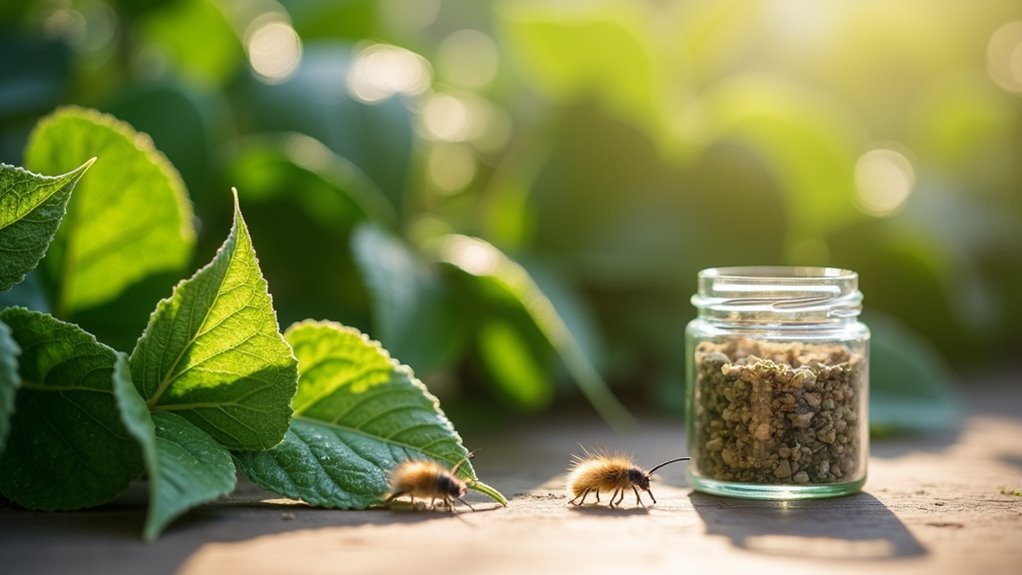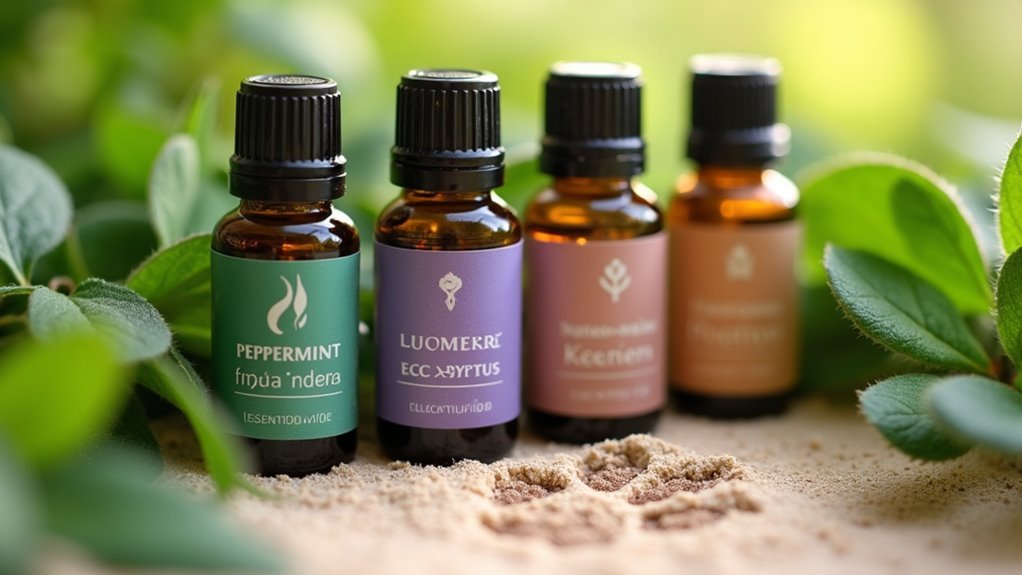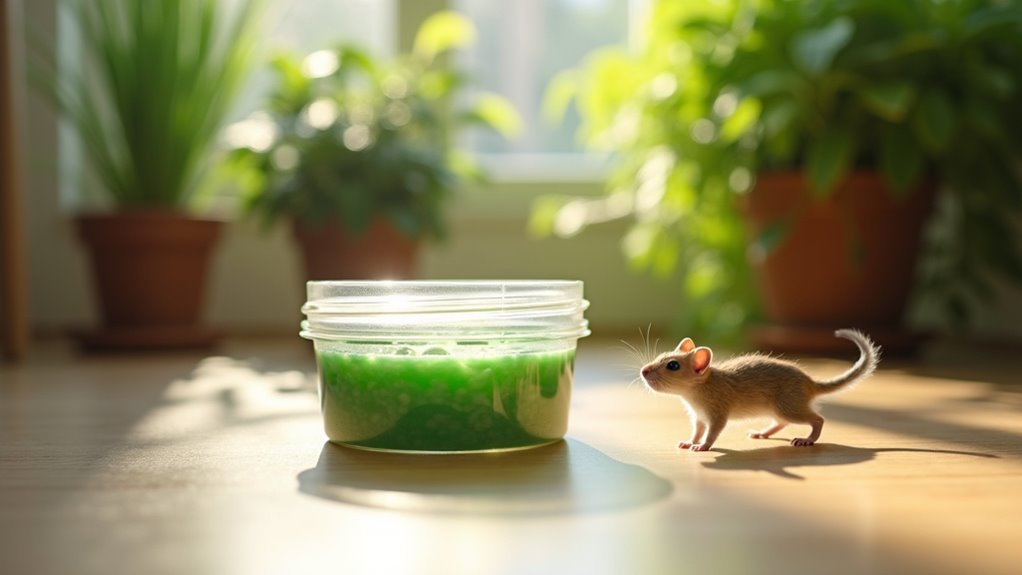You should choose pet-friendly substitutes for boric acid because it poses serious health risks to your furry companions, including vomiting, diarrhea, respiratory distress, skin irritation, and potentially death from ingestion or inhalation. Safe alternatives like food-grade diatomaceous earth, diluted essential oils, baking soda solutions, and sealed bait stations effectively control pests without endangering your pets’ health. These natural options provide reliable pest management while protecting your beloved animals from toxic exposure and creating a safer home environment for everyone.
Health Risks of Boric Acid Exposure in Pets

While boric acid serves as an effective household cleaner and pest control agent, it poses serious health risks to your pets that you can’t ignore.
When ingested, boric acid causes toxicity in pets, triggering vomiting, diarrhea, and lethargy. Severe cases can even result in death.
Boric acid ingestion triggers severe pet toxicity symptoms including vomiting, diarrhea, and lethargy, with potentially fatal outcomes in serious cases.
Your pet’s respiratory system suffers when they inhale boric acid dust, leading to coughing, sneezing, and breathing difficulties.
Direct contact causes skin irritation, including redness and itching in sensitive areas.
Even small amounts from insecticides accumulate over time, creating chronic health problems like reproductive issues and organ damage.
These serious health risks make choosing pet-friendly alternatives that are safe for pets absolutely essential for protecting your furry companions.
Food-Grade Diatomaceous Earth as a Natural Alternative
Since you need a safer alternative to boric acid, food-grade diatomaceous earth (DE) offers an excellent natural solution that won’t harm your pets.
This pet-friendly option consists of fossilized diatoms that work as effective roach killers through dehydrating insects rather than toxic chemicals.
When you apply correctly in thin layers where roaches frequent, DE damages their exoskeletons without leaving harmful residues.
Key advantages of using food-grade DE for pest management:
- Non-toxic composition makes it safe for pets in small amounts
- Natural deterrents provide gradual solution with visible results in 1-3 weeks
- Unlike boric acid, doesn’t pose toxicity risks to your furry companions
- Works effectively in dry conditions when kept away from pet access areas
Essential Oil-Based Repellents for Safe Pest Control

Essential oil-based repellents provide another excellent pet-safe alternative that harnesses the power of natural compounds to deter cockroaches from your home.
These natural pest repellents offer effective pest control while prioritizing health and safety for your family and pets.
Peppermint oil stands out as particularly potent since it disrupts cockroaches’ nervous system, creating a powerful deterrent effect.
Peppermint oil’s natural compounds target cockroach nervous systems, making it an exceptionally effective and safe pest deterrent for homes.
When you’re implementing these DIY methods, always dilute essential oils with water—typically a few drops per cup—to guarantee they’re safe for pets while maintaining effectiveness.
You can create protective barriers by applying diluted solutions to entry points and pathways where roaches commonly travel.
These pet-friendly essential oils mask attractive scents that draw pests while simultaneously making your home smell fresh and inviting.
Baking Soda and Sodium Sesquicarbonate Solutions
Two household staples offer remarkably effective alternatives to boric acid for safe pest control without compromising your pets’ wellbeing.
Baking soda provides a non-toxic solution that absorbs moisture and neutralizes odors while creating an inhospitable environment for pests.
Sodium sesquicarbonate delivers more potent cleaning power than regular baking soda, maintaining effectiveness without harmful residues that could endanger your furry companions.
These pet-friendly options excel in DIY pest control applications, particularly for natural roach elimination.
You’ll appreciate their dual functionality – they’re excellent for household use in eco-friendly cleaning while simultaneously working to eliminate pests safely.
- Baking soda neutralizes odors and softens hard water without toxic risks
- Sodium sesquicarbonate offers biodegradable, powerful cleaning action safe for pets
- Both ingredients absorb moisture that attracts unwanted insects
- These alternatives promote sustainable cleaning practices without harsh chemicals
Pet-Safe Gel Baits and Sealed Bait Stations

While traditional boric acid poses risks to curious pets, modern gel baits containing indoxacarb offer a targeted approach that disrupts cockroach nervous systems without endangering your furry companions.
These pet-safe gel baits can be applied in hidden areas inaccessible to pets, delivering effective pest management within 3–7 days while leaving minimal harmful residues.
Pet-safe gel baits work in hidden spots, eliminating cockroaches within one week while protecting your furry family members.
Sealed bait stations provide another excellent solution for roach infestations. They’re specifically designed to attract and kill cockroaches while keeping active ingredients completely away from pets.
You can strategically position these stations throughout your home without worrying about your pet’s safety and health.
Both options enable long-term control of cockroach populations while remaining safe for pets, making them superior alternatives for effective pest control in households with animals.
Frequently Asked Questions
Is Boric Acid Pet Friendly?
Boric acid isn’t pet-friendly since it’s moderately toxic to your pets if they ingest large amounts. You’ll see symptoms like vomiting and depression, plus skin irritation from contact.
What Is the Best Pet Friendly Way to Get Rid of Roaches?
You’ll get best results using food-grade diatomaceous earth or cockroach gel baits with indoxacarb. These target roaches effectively while keeping pets safe. Regular cleaning and sealing entry points prevents future infestations.
What Does Boric Acid Do to Animals?
Boric acid causes toxicity in your pets if they ingest it, leading to vomiting, depression, and gastrointestinal distress. It’s also caustic, potentially irritating your animal’s skin and eyes upon contact.
How Do You Use Boric Acid for Roaches if You Have Pets?
You’ll place boric acid in areas pets can’t reach, like behind appliances or inside cracks. Mix it with sugar in shallow containers, store it securely, and clean spills immediately.
In Summary
You’ll protect your furry family members by choosing pet-friendly alternatives to boric acid. These safer options won’t compromise your pest control effectiveness while eliminating the risk of accidental poisoning. Whether you’re using diatomaceous earth, essential oils, or sealed bait stations, you’re making a responsible choice that keeps your home pest-free without endangering your pets’ health. Your peace of mind is worth the switch to these proven alternatives.





Leave a Reply